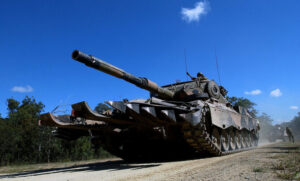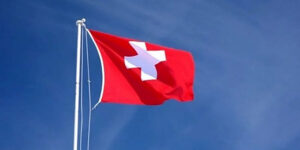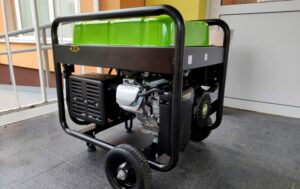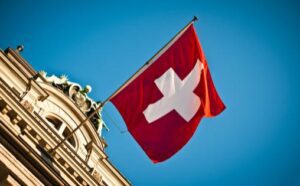
Sweden will support the Grain from Ukraine initiative to ensure food security by providing an additional SEK 100 million (approximately $9.6 million) through the UN World Food Program (WFP), Swedish Prime Minister Ulf Kristersson said in a live webcast of the initiative’s summit in Kyiv on November 25.
For his part, Swiss President Alain Berset, who attended the summit, announced that Switzerland would contribute to the relief effort by providing CHF 3 million (about $3.4 million) to the World Food Program.
“As a result of Russia’s military aggression, agricultural production in Ukraine has fallen by 45%; about 11 million people in the country are dependent on food aid,” the Swiss Embassy in Ukraine said in a Facebook post.
“It is admirable how Ukraine is defending its country against Russia’s ongoing aggression and at the same time contributing to the global food supply. We support Ukraine’s efforts to export grain and other agricultural products to world markets and to the most vulnerable countries,” the Swedish government’s website quoted the Prime Minister as saying.
It is specified that since Russia’s full-scale invasion of Ukraine in February 2022, Sweden has allocated more than SEK 28 billion for various efforts to support Ukraine.
Lithuanian Prime Minister Ingrida Šimonite announced an additional EUR 2 million at the summit. Another EUR 3 million was provided by Finland.
Following the summit, President of Ukraine Volodymyr Zelenskyy said that last year, the Grain from Ukraine program managed to attract about $180 million, while this year it has raised more than $100 million.
“This is support for other countries and support for Ukrainian exports and farmers. This is very important. I think we will be able to double this figure,” the President of Ukraine said.

The Swiss authorities said that they rejected a request by arms manufacturing company Ruag AG for permission to sell nearly a hundred Leopard 1 A5 tanks to Germany for their subsequent transfer to Ukraine.
“The Federal Council on June 28 rejected a request from Ruag AG concerning the export of 96 Leopard 1 A5 tanks destined for Ukraine, as it is contrary to current legislation,” the Swiss Federal Council said in a statement issued Wednesday.
The council explained that such a sale would violate Swiss law in force. In addition, the deal “would violate Switzerland’s position on neutrality.”
Ruag AG submitted an export request to the authorities on June 27 for the resale of 96 used and inoperable Leopard 1 A5 tanks. The tanks are currently in storage in Italy and need to be repaired in Germany before being shipped elsewhere.
The Leopard 1 was the main battle tank of the FRG until the 1980s. It was produced from 1965 to 1984 and was in service with the Federal Republic of Germany until 2010. More than a dozen countries still have it in their armed forces, including Greece, Turkey, Brazil, Italy, Chile, Australia and Canada; the tank is continuously upgraded. Totally more than 4.7 thousand tanks of this model were produced. The tank is equipped with a 105mm rifled gun with a load of 60 rounds. The tank is equipped with optical stereoscopic rangefinder, binocular, monocular with night channel and telescopic sights. Speed of the Leopard 1 on a highway is 62 km/h, range – 600 km.

Switzerland is ready to provide long-term support and intends to allocate for Ukraine at least another $1.7 billion over the period until 2028, Swiss Info reports citing Foreign Minister Ignazio Cassis.
“Swiss Foreign Minister Ignazio Cassis stressed that his country is ready to provide long-term support to Ukraine and that Bern intends to allocate at least another 1.5 billion Swiss francs ($1.7 billion) to Kiev over the period until 2028,” the website said Thursday.
It noted that “this support will be provided as part of the overall international cooperation strategy announced by the Swiss Ministry of Foreign Affairs (EDA) on Wednesday, April 12, 2023.”
“With the 300 million francs already allocated by Bern for 2023 and 2024, Switzerland will provide a total of at least 1.8 billion francs in support to Ukraine over the next six years,” it said.
In addition, the foreign minister speaking at the meeting of the World Bank Group (WBG) and the International Monetary Fund (IMF) in Washington stressed the importance of the Lugano Declaration, adopted on July 5, 2022 in Lugano.
The declaration provides seven principles for Ukraine’s recovery process: partnership, focus on reform, transparency, democratic participation, multi-stakeholder engagement, equity and sustainability.
Cassis notes that “this document contains important guiding principles of international support for Ukrainian reforms.”
Before the conference in Washington, D.C., the Swiss foreign minister held consultations with Ukrainian Prime Minister Denis Shmygal.

Switzerland organized another batch of humanitarian aid for the population of Ukraine in the form of 40 heaters and the same number of generators, according to the Ministry of Foreign Affairs of Switzerland.
“The materials were collected in Switzerland by the Swiss Agency for Development and Cooperation (SDC), which also organizes transport. The possibility of sending additional relief materials is being considered,” the report said.
The agency reported that trucks with this equipment left for Ukraine on December 23. The shipment is part of a broader action plan to help the people of Ukraine survive this winter.
It is noted that Switzerland already delivered thirty generators last week.

Switzerland followed the EU in imposing new sanctions against Russia, with 141 individuals and 49 legal entities added to the “black lists,” the Swiss government said in a statement.
“Switzerland, by amending the sanctions lists on December 21, thus joined the EU measures,” the press release said.
“Switzerland is amending the sanctions regime as part of the measures that the EU adopted in connection with the supply of Iranian drones to Russia and the continuing alarming situation in Ukraine,” the document specified.
The sanctions will take effect at 6 p.m. local time.
According to the statement, on December 16, the EU also imposed a ban on exports to Russia of a number of other categories of goods and services, and the Swiss government, in turn, will study these measures.
On December 16, the EU Council approved the ninth package of sanctions against Russia, which includes restrictions against the mining and energy sectors and a ban on exports of space industry goods and drones.
Among other things, the EU also added 168 more entities related to the defense industry of Russia to its “black lists. In addition, the ninth EU sanctions package against Russia included 144 individuals, including high-ranking Russian officials, MPs, military personnel and artists from Russia.

Switzerland on Wednesday approved the eighth package of sanctions against Russia, which includes the introduction of a “ceiling” on Russian oil prices.
“The Swiss Federal Council adopted another set of sanctions against Russia on November 23. The council approved the measures adopted by the European Union as part of the eighth sanctions package,” the document published on the Federal Council’s website reads.
“The sanctions include a legal basis for imposing a ‘ceiling’ on prices of Russian oil and oil products, as well as restrictions on iron and steel goods, aerospace products and goods of economic importance to Russia,” the statement stressed.
It is specified that the sanctions will take effect at 18:00 Wednesday local time (19:00 KSC).
The new measures also include a ban on the provision of IT, engineering, architectural and legal services to the Russian authorities and companies. In addition, a ban is introduced for citizens of Switzerland to occupy managerial positions in some companies owned by Russia.
The document notes that on October 12, the Swiss authorities added 30 more individuals and entities to the sanctions list for Russia.
The EU adopted the eighth package of sanctions with similar measures on October 6 in response to Russia’s escalation of military aggression against Ukraine.